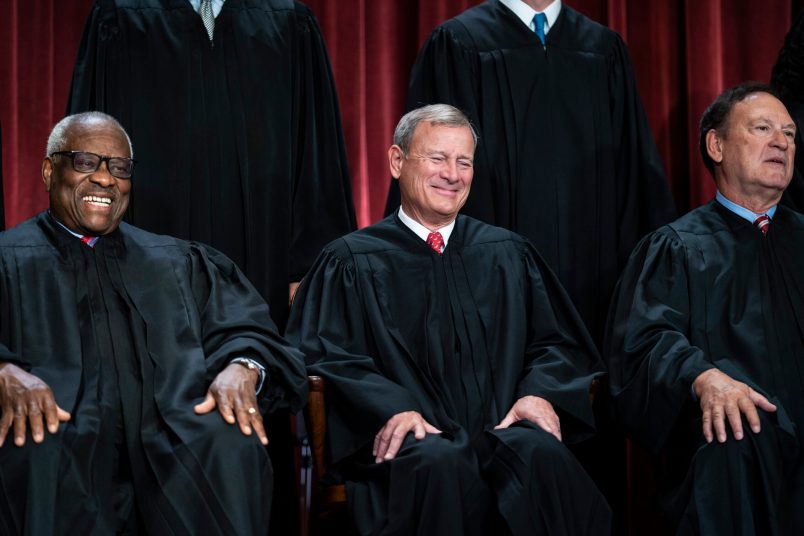The Supreme Court on Monday released a code of conduct laying out ethical rules for its nine Justices after nearly a year of revelations of unreported luxury trips, gifts, and secret real estate deals at the high court.
All nine justices signed onto the code, which does not have an enforcement mechanism.
In a brief statement prefacing the new rules, the court admitted that the lack of a code had led “to the misunderstanding that the Justices of this Court, unlike all other jurists in this country, regard themselves as unrestricted by any ethics rules.”
Nonprofit newsroom ProPublica ran a series of blockbuster exposes this year revealing how Justice Clarence Thomas received multiple luxury vacations across a span of 20 years from billionaire Harlan Crow without properly disclosing them. Another report detailed how Justice Samuel Alito hopped on a private jet paid for by GOP donor and billionaire Paul Singer en route to a remote Alaska fishing vacation, also without disclosing it.
Those reports, along with other revelations and a Senate Judiciary Committee investigation into ethical violations at the high court, upped pressure on the high court to, at the very least, adopt an ethics code laying out the rules by which its justices should abide.
All nine justices pushed back on the Senate investigation in an April joint statement, reiterating its position that, even without a code, the court abides by the ethical rules which apply to the entire federal judiciary.
Justice Alito pushed further in July, saying that he believed Congress lacked the authority to impose a ethical code on the court.
On Monday, the justices dismissed criticism in the statement as a “misunderstanding” that any of them held themselves to a different standard than that of the rest of the federal judiciary.
“To dispel this misunderstanding, we are issuing this Code, which largely represents a codification of principles that we have long regarded as governing our conduct,” the statement reads.
Read the code here:







How is it possible that I’m simultaneously angry, disappointed and unsurprised?!?!
Dangerously close to the truth, looks like. Haven’t heard from Alito in a while and you couldn’t shut him up there for a minute.
Lacking an enforcement mechanism renders these “guidelines” to be useless.
Their argument is that this code didn’t need to be written down because they were already abiding by it.
That means we don’t need to read it, because all the evidence of corruption we’ve seen this summer is still wrong and illegal. If the code doesn’t forbid it, it’s a worthless code, and if it does forbid it, it’s an ineffectual code.
And, as many have already noted, lack of enforcement mechanism means it’s just PR rather than a code.